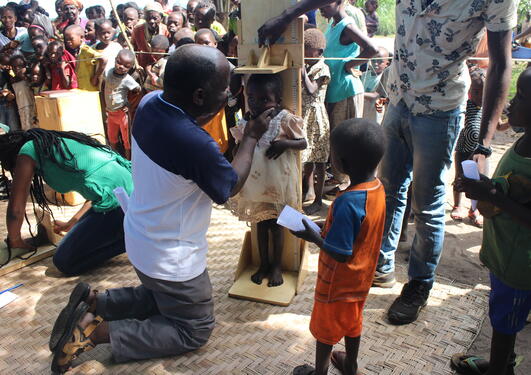GROWNUT II - Developing a cadre of African nutrition scholars and leaders to address nutrition disorders and influence nutrition policy
Three CIH Professors will be involved in GROWNUT II, Anne Hatløy (Associate Professor), Ingunn Engebretsen, and Thorkild Tylleskär. The project will be implemented in Tanzania and the Democratic Republic of Congo, and will have collaborating partners from South Africa.

Main content
The GROWNUT-2 project aims to address the shortage of research capacity to inform the development of locally relevant, evidence-based policies in two low-income countries, using nutrition as the vehicle for capacity building.
The proposed GROWNUT-2 partnership will develop and support postgraduate training in nutritional epidemiology in Tanzania and DRC, building on the success of the GROWNUT-1 project in DRC. We will apply lessons we learned in GROWNUT-1, and further informed by an internal evaluation conducted in the final year of the project. We will develop a blended learning package in nutritional epidemiology that will be implemented in the two sites. It will also involve post-graduate student research linked to a demand-driven locally relevant research agenda in each country. The project partnership is strongly linked to the Ministry of Health in both countries. The goal is to a cadre of African nutrition researchers as well as a locally produced body of high-quality research to inform nutrition policy in Tanzania and DRC.
Health research has a key role in the development of low-income countries. Lack of research capacity and limited academic leadership are, however, challenges to translating research findings into effective evidence-based interventions that inform policy and improve health status in these settings. Traditionally most evidence used to inform policies and guidelines comes from high income countries, and this may not fully address the contextual challenges found in low-income countries. There is a need to develop local research capacity to bridge this gap and provide applicable and affordable local interventions, which may serve in turn as models for other low-income settings.
Importance of nutrition as a field of study
Poor nutrition remains one of the most important and over-arching causes of ill health globally. In many low-income countries there has been little improvement in nutrition indicators, despite multiple interventions, over many years. In addition, this project has immense relevance for the first three SDGs (no poverty, zero hunger, and ensure good health and wellbeing for all).
Nutrition is essential for growth and development. Malnutrition has severe developmental, economic, social, and medical consequences for individuals throughout their lifespan, as well as for families and coming generations, and for communities, regions, and countries. Poor nutrition during the first 1000 days following conception can have lifelong consequences including educational and employment attainment, with malnourished individuals failing to achieve their full potential and becoming trapped in cycles of poor health and poverty.
Nutrition plays a foundational role in underpinning the immune system which protects against communicable diseases and contracting non-communicable diseases later in life. Types of malnutrition include undernutrition (wasting, stunting, underweight), vitamin or mineral deficiencies, as well as overweight and obesity. The burden of hidden hunger or micronutrient deficiency resulting from predominantly calorie-dense unbalanced diets is also disproportionately higher among populations in sub-Saharan Africa. Sub-optimal intake of food containing essential micronutrients such as zinc, iron, calcium, and vitamins, compromises the health of children and adults alike. Cultural changes, urbanisation and socio-economic development have given rise to the co-existence of under- and over-nutrition, often in the same household, community or population. To a large extent elderly, women in reproductive age and growing children are more susceptible to undernutrition issues particularly wasting, stunting or micronutrient deficiencies. Further, the urban poor are more susceptible to inadequate nutrition related to high energy, low nutrient foods which in the long term make them at risk for metabolic diseases: cardiovascular disease, diabetes mellitus and obesity related complications.
About the project
GROWNUT-2 is a collaborative project within the NORHED sub-programme “Health” that will bring a new partner at MUHAS, Tanzania into the established GROWNUT-1 partnership between UNIKIN, UIB and UKZN. Building on the experience from the GROWNUT-1 nutritional epidemiology (EpiNut) programme in DRC, the GROWNUT-2 partnership aims develop a cadre of African nutrition scholars and academic leaders to address nutrition disorders and influence nutrition policy.
The project will adapt the existing EpiNut curriculum for a blended learning approach, by combining face-to face learning with online resources, interactive online engagement and assessments. It will thereby provide a flexible educational package for use by Master and PhD students. We will undertake a continuous evaluation of the blended learning approach, feeding in learnings from students and staff experiences of the programme to continuously improve the package.
At the completion of GROWNUT-2, a large number of researchers and nutrition experts with have graduated, having been trained using a replicable sustainable educational approach, which can be rolled out to other sites and countries or provide a model for blended learning for other fields of study. The GROWNUT-2 team will work closely with stakeholders in Tanzania and DRC, particularly with Tanzania Food and Nutrition (TFNC) and PRONANUT from the Ministries of Health, to develop a research agenda based on nutrition priorities. We will co-ordinate the research from the EpiNut PhD and Master students to address these priorities, and develop a strong body of research to support health policy development in Tanzania and DRC. All nutritional epidemiology students will undertake a residential internship in a rural site to ensure that graduates have first-hand experience of the nutrition conditions affecting communities that are most in need. We will support the development of academic leadership and dissemination of research findings, by supporting grant-writing, academic writing and publishing, and conference presentations.
Objectives
Aim
To develop a multi-country North-South-South collaboration to support education and capacity building in nutritional epidemiology as well as the implementation of high quality, policy relevant nutrition research in Tanzania and DRC.
Objectives
The project will be undertaken as a partnership between four institutions of higher learning, one from the global North and three from the global South. The members of the partnership are as follows: KSPH, at UNIKIN, DRC; SPHSS at MUHAS, Tanzania; CRH, at UKZN, South Africa; and CIH, UiB, Norway.
The project has the following objectives:
- To establish and support a postgraduate programme in nutritional epidemiology to Master and PhD level at KSPH and SPHSS
- To develop a replicable and sustainable education package to support a nutritional epidemiology Master and PhD programme, based on a blended-learning approach.
- To develop an inclusive and relevant research agenda at KSPH and SPHSS in partnership with Ministries of Health in DRC and in Tanzania
- To support implementation of demand-driven, locally relevant nutrition research, embedded in the postgraduate nutritional epidemiology programme, in KSPH and at SPHSS
- To provide appropriate multi-stakeholder feedback at local, national and international level to inform future partnerships and provide inputs to the wider policy and research on nutrition



